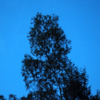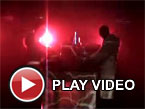Gate, "A Republic of Sadness"

The Dead C's Michael Morley has been releasing solo albums under the Gate moniker since the mid-'90s, but his latest effort is a curve ball that probably no one saw coming: after a decade-long hiatus, Morley has surfaced with an electronic dance album...of sorts. Thankfully, despite ditching his signature gnarled guitars for synthesizers, drum machines, and a laptop, there is no evidence at all that Michael has gone soft. In fact, A Republic of Sadness attains a whole new level of inspiration and subversion, proving that even catchy dance beats can be crushed beneath the weight of Morley's party-killing world-weariness.
I am convinced that Michael Morley must have recently designed a pedal or software application that filters everything he does through malaise or late-night existential anguish (and if he had a "vaguely hostile nihilism" one before, it must have broke).That is the only possible explanation for a song like "Desert," where he is able to make an over-the-top funky synth hook and a propulsive, bouncy beat sound somehow grimy and hopelessly sad.Of course, the fact that there even are hooks at all here is a bit of a startling development, but Morley definitely bends them to his own aesthetic and there is no danger of him ever scoring a hit or enlivening a dancefloor.Each of these six songs can certainly boast something attention-grabbing, like the machine-like percussion of "All" or the awesomely haunting distorted synth motif of "Trees," but Michael inevitably subverts their undeniable immediate appeal by relentlessly looping them into oblivion for the entire duration of each lengthy song.
Longtime fans of Gate may miss the ugly feedback and shambling menace of both The Dead C and Morley's previous solo work, but in most other respects he seems to be the same guy as always, just using some new tools.For example, he still seems pretty hostile towards any kind of conventional song structure or development (though he has made things a bit tighter and punchier than usual this time around).Also, his vocals are still mumbly as hell and sound like they are being dragged out of him against his will.It is a formula that absolutely should not work at all, but for some perverse reason it does.For all his deliberate self-sabotage and willful wrongness, these pieces all achieve a mesmerizing cumulative power and a very appealing nocturnal bleariness.Few artists would ever attempt something as foolhardy as totally casting aside the very things for which they have been known and revered for 20 years (entropy and guitar abuse, in this case), but Morley clearly knew exactly what he was doing.I don't know if A Republic of Sadness is necessarily an improvement over Gate's more snarling, amorphous, and immediately recognizable earlier works like The Dew Line, but Morley's vision was certainly strong enough to survive the stylistic transition relatively intact.At the very least, this is some of the finest late-night listening that I have heard this year.
Samples:
 




